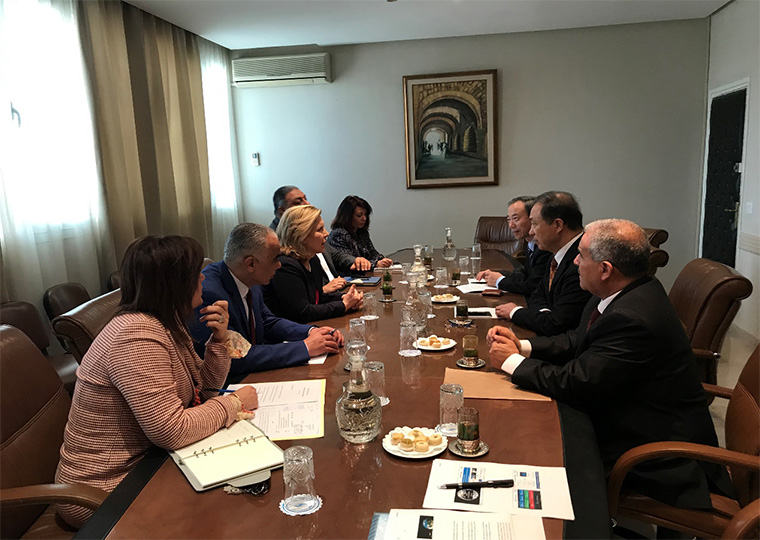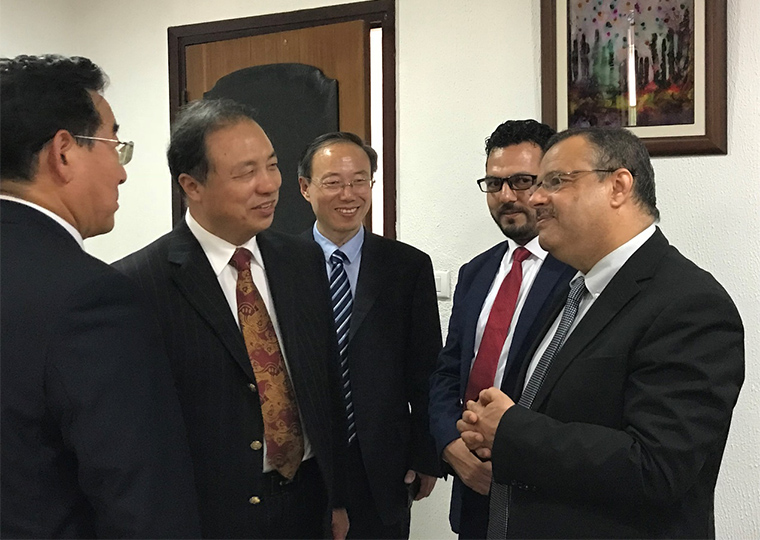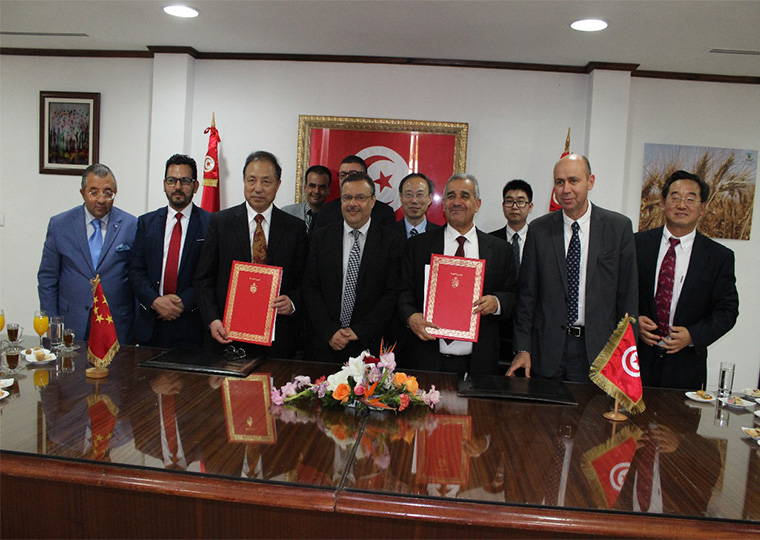“Digital Belt and Road” step into Africa---Tunisia
DBAR Archaeological Achievements event was organized from 18th to 20th April 2018, to highlight and celebrate the achievements of the DBAR program made by the DBAR Heritage Working group. The strong DBAR delegation was led by Prof. GUO Huadong, the Chair of The Digital Belt and Road Program(DBAR), during the launch of the event in Tunis, Tunisia. Other important attendees included the Minister of Tourism Ministry of Tunisia、Minister of Culture Ministry and Minister of Agriculture Ministry. The two sides exchanged and discussed the cooperation in related fields.
The Tunisian Minister of Tourism, Salma Loumi, expressed that the new archaeological discoveries of DBAR Research Group are very important to Tunisian Tourism, and allow for promoting tourism development in the country but also add to the value of Tunisia as a tourist destination. Tunisian Tourism Ministry expressed the hope to maintain close cooperation with DBAR long into the future.
The Tunisian Cultural Minister, Mohamed Zin Alabidin, praised DBAR expertise and expressed it as a great example of Chinese research and intellectual abilities. He appreciated the excellent scientific discovery made by DBAR research team in Tunisia and hoped this will continue to contribute much to Tunisia's socio-economic development. The minister encouraged continued coordination between the Tunisian and DBAR scientists and expressed anticipation for further fruition of this collaboration in various fields.
The Tunisian Agriculture Ministry, Samir Altayeb, expressed hope that the two sides can strengthen cooperation other relevant fields, such as agricultural monitoring, yield estimation, water resources management and environmental monitoring are important areas where future collaboration is desirable. He expressed support of The Ministry of Agriculture for establishment of a DBAR international center for excellence in Tunisia to strengthen the scientific and academic exchanges between Chinese and Tunisian researchers and enhance Tunisia's ability to adopt scientific and technological methods towards sustainable development.
Prof. Guo Huadong expressed that Cultural heritage are a precious wealth left by our ancestors. They record important information about human evolution and our history and therefore need to be monitored and protected. He praised the grandeur of the Tunisian culture and praised the long and rich history. He stated that this archaeological discovery is the result of the unremitting efforts made by both the scientists of China and Tunisia. He expressed that DBAR is willing to work closely with the Tunisian research institutes to continue to explore the history culture of Tunisia and to promote and further develop the China-Tunisia scientific and technological cooperation. He further stated that DBAR is willing to strengthen cooperation with Tunisia in the fields of Heritage Archaeology, Ecological Environment and Urban Development Etc. as well as willing to provide key technical support for the tourism development of Tunisia using spatial technology.
Prof. GUO Huadong stated that Tunisia is one of the important pivots in African Region on “One Belt and One Road”, as well as the very important bridge between Europe and Africa. Prof. Guo Huadong expressed that as an international science plan, the fundamentals of DBAR are to support the sustainable development in the “One Belt and One Road” region through the service of big earth data, by sharing, experience, technology, data, and knowledge. He articulated DBAR’s support for cooperation with Tunisia in agriculture monitoring and food security, water resources management, spatial and temporal patterns of water resources and security etc.
Under the testimony of Samir Altayeb (minister of agriculture of Tunisia), Prof. Guo Huadong, the President of DBAR and Houcine Khatteli, Director of the Institute of Agricultural Research in the arid region of Tunisia, signed a Memorandum of Understanding on cooperation between the two sides. The two sides will strengthen research and conduct model studies to demonstrate the application of space information technology in the fields of agricultural monitoring, space archaeology, heritage protection, desertification monitoring, environmental change, soil erosion and the like in arid areas, within the context of sustainable development of Tunisian. The two sides vowed to further strengthen bilateral and multilateral cooperative studies under the framework of DBAR, focusing on regional and global sustainable development issues of common concern.
The Tunisian Minister of Tourism, Salma Loumi, expressed that the new archaeological discoveries of DBAR Research Group are very important to Tunisian Tourism, and allow for promoting tourism development in the country but also add to the value of Tunisia as a tourist destination. Tunisian Tourism Ministry expressed the hope to maintain close cooperation with DBAR long into the future.
The Tunisian Cultural Minister, Mohamed Zin Alabidin, praised DBAR expertise and expressed it as a great example of Chinese research and intellectual abilities. He appreciated the excellent scientific discovery made by DBAR research team in Tunisia and hoped this will continue to contribute much to Tunisia's socio-economic development. The minister encouraged continued coordination between the Tunisian and DBAR scientists and expressed anticipation for further fruition of this collaboration in various fields.
The Tunisian Agriculture Ministry, Samir Altayeb, expressed hope that the two sides can strengthen cooperation other relevant fields, such as agricultural monitoring, yield estimation, water resources management and environmental monitoring are important areas where future collaboration is desirable. He expressed support of The Ministry of Agriculture for establishment of a DBAR international center for excellence in Tunisia to strengthen the scientific and academic exchanges between Chinese and Tunisian researchers and enhance Tunisia's ability to adopt scientific and technological methods towards sustainable development.
Prof. Guo Huadong expressed that Cultural heritage are a precious wealth left by our ancestors. They record important information about human evolution and our history and therefore need to be monitored and protected. He praised the grandeur of the Tunisian culture and praised the long and rich history. He stated that this archaeological discovery is the result of the unremitting efforts made by both the scientists of China and Tunisia. He expressed that DBAR is willing to work closely with the Tunisian research institutes to continue to explore the history culture of Tunisia and to promote and further develop the China-Tunisia scientific and technological cooperation. He further stated that DBAR is willing to strengthen cooperation with Tunisia in the fields of Heritage Archaeology, Ecological Environment and Urban Development Etc. as well as willing to provide key technical support for the tourism development of Tunisia using spatial technology.
Prof. GUO Huadong stated that Tunisia is one of the important pivots in African Region on “One Belt and One Road”, as well as the very important bridge between Europe and Africa. Prof. Guo Huadong expressed that as an international science plan, the fundamentals of DBAR are to support the sustainable development in the “One Belt and One Road” region through the service of big earth data, by sharing, experience, technology, data, and knowledge. He articulated DBAR’s support for cooperation with Tunisia in agriculture monitoring and food security, water resources management, spatial and temporal patterns of water resources and security etc.
Under the testimony of Samir Altayeb (minister of agriculture of Tunisia), Prof. Guo Huadong, the President of DBAR and Houcine Khatteli, Director of the Institute of Agricultural Research in the arid region of Tunisia, signed a Memorandum of Understanding on cooperation between the two sides. The two sides will strengthen research and conduct model studies to demonstrate the application of space information technology in the fields of agricultural monitoring, space archaeology, heritage protection, desertification monitoring, environmental change, soil erosion and the like in arid areas, within the context of sustainable development of Tunisian. The two sides vowed to further strengthen bilateral and multilateral cooperative studies under the framework of DBAR, focusing on regional and global sustainable development issues of common concern.

The DBAR delegation met with the Minister of Tourism of Tunisia

Prof. Guo Huadong met with Mohamed Zin Alabidin, the Minister of Culture Ministry

Prof. Guo Huadong met with Samir Altayeb, the Minister of Agriculture Ministry

Prof. Guo Huadong, the President of DBAR and Houcine Khatteli, Director of the Institute of Agricultural Research in the arid region of Tunisia, signed a Memorandum of Understanding